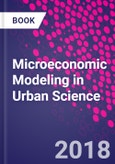Microeconomic Modeling in Urban Science proposes an interdisciplinary framework for the analysis of urban systems. It portrays agents as rational beings modeled under the framework of random utility behavior and interacting in a complex market of location auctions, location externalities, agglomeration economies, transport accessibility attributes, and planning regulations and incentives. Francisco Javier Martinez Concha considers the optimal planning of cities as he explores interactions between citizens and between citizens and firms, the mesoscopic agglomeration of firms and the segregation of agents' socioeconomic clusters, and the emergence of city-level scale laws. Its unified model of city life is relevant to micro-, meso- and macro-scale interactions.
Please Note: This is an On Demand product, delivery may take up to 11 working days after payment has been received.
Table of Contents
1. Introduction 2. Accessibility 3. Theory of a discrete urban land market 4. A stochastic model of urban systems 5. Equilibrium analysis 6. Dynamic of urban land use 7. Applications and policy analysis 8. City scale laws








